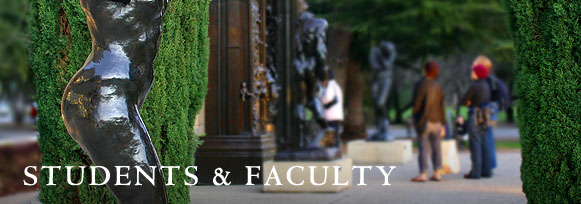The Geballe Prize for Writing
Freshman and Sophomores, submit your writing about the Cantor, and you could win $750!
The Geballe Prize was established to encourage Stanford University faculty and students to utilize the Cantor Arts Center as a resource for intellectual discovery by honoring outstanding examples of writing related to the Cantor, its collections, exhibitions, or programs. Submissions may be analytical, argumentative, or creative prose or poetry written by freshmen and sophomore students independently or as part of coursework in any discipline. Winners receive a $750 cash award and are recognized at a special program at the Cantor.
About: The Geballe Prize for Writing consists of three separate awards:
• The Geballe Prize for Writing: Creative Prose
• The Geballe Prize for Writing: Poetry
• The Geballe Prize for Writing: Essay
- All first- and second-year Stanford University undergraduate students who write research or expository papers, creative prose, or poetry that relates in some way to the Cantor Arts Center, its collections, exhibitions, or programs, are eligible.
- Entries should be meticulously revised, edited, and free of any errors in format, documentation, usage, or mechanics. Entries should be ready for publication.
- Submissions will be evaluated by a panel of reviewers for strong and expressive style, complex thought, cogent language, and active engagement with art or related activities at the Cantor Arts Center.
- Each winner will receive a $750 cash award.
- Winners will be notified in May and will receive their award at a celebratory luncheon.
- The prize is supported by the Geballe Fund for Academic Initiatives in the Cantor Arts Center.
Submission Procedure: Submit each entry with five copies. Only one copy should include the identity of the author; the other four copies should cite only the title of the piece.
- A completed entry form should accompany each submission.
- Stanford faculty members are encouraged to nominate students’ written pieces for any of the three Geballe Prizes.
Deadline: Friday, April 3, 5 pm
Questions? Contact Issa Lampe at 650-725-6099 or ilampe@stanford.edu
Send entries to:
Issa Lampe, Curator for Education
Cantor Arts Center at Stanford University
328 Lomita Drive, Stanford, CA 94305-5060
Past Awards
2013
 Essay: Kalyn McCall, "Divine Humanity: Henry Fuseli's Adam and Eve (1796-1799)" written for History 132a: The Enlightenment and the Arts
Essay: Kalyn McCall, "Divine Humanity: Henry Fuseli's Adam and Eve (1796-1799)" written for History 132a: The Enlightenment and the Arts
 Creative Prose: Leow Hui Min Annabeth, "The Word Made Me" written in response to Aisha Khalid's Name, Class, Subject in the exhibition The Jameel Prize: Art Inspired by Islamic Tradition
Creative Prose: Leow Hui Min Annabeth, "The Word Made Me" written in response to Aisha Khalid's Name, Class, Subject in the exhibition The Jameel Prize: Art Inspired by Islamic Tradition
 Poetry: Kasiemobi Udo-okoye, "The Old Taste of Being Frozen" inspired by Auguste Rodin's Eve
Poetry: Kasiemobi Udo-okoye, "The Old Taste of Being Frozen" inspired by Auguste Rodin's Eve
2012

Essay: Maya Krishnan, "The Artist, the Outlaw, and the Institutionalization of Rebellion" written for History 132a: The Enlightenment and the Arts
 Creative Prose: Helen Anderson, "Figure Ate" inspired by Richard Serra's Sequence
Creative Prose: Helen Anderson, "Figure Ate" inspired by Richard Serra's Sequence
2011
 Kevin Chow, "China in Flux: Changing Images in Chinese Landscape Painting" written for the Program in Writing and Rhetoric: Speaking About Art/Narrating the Cantor's Collections
Kevin Chow, "China in Flux: Changing Images in Chinese Landscape Painting" written for the Program in Writing and Rhetoric: Speaking About Art/Narrating the Cantor's Collections
2010
 Lee Axelrod,"The Influence of Location: How California Affected the Bay Area Figurative Artists" written for the Program in Writing and Rhetoric: Speaking about Art
Lee Axelrod,"The Influence of Location: How California Affected the Bay Area Figurative Artists" written for the Program in Writing and Rhetoric: Speaking about Art
2009
 Miles Osgood, “Of the Devil’s Party? Thomas Stothard and the Nascent Romantic Satan” written for History 132a: The Enlightenment and the Arts
Miles Osgood, “Of the Devil’s Party? Thomas Stothard and the Nascent Romantic Satan” written for History 132a: The Enlightenment and the Arts
This paper was published in the Cantor Arts Center Journal, vol. 6.
2008 Cynthia He, "Metamorphosis in Progress: Reflections on My Relationship with the Cantor Arts Center" written for Psychiatry 76Q: Temperament and Creativity in Mood Disorders
Cynthia He, "Metamorphosis in Progress: Reflections on My Relationship with the Cantor Arts Center" written for Psychiatry 76Q: Temperament and Creativity in Mood Disorders
2007
prize not awarded
 Alex Blackstock, "Seeing Red: The Bolshevik Poster Propaganda Campaign and the Psychology of Social Cohesion" written for the Program in Writing and Rhetoric: Speaking with Things: The Rhetoric of Display
Alex Blackstock, "Seeing Red: The Bolshevik Poster Propaganda Campaign and the Psychology of Social Cohesion" written for the Program in Writing and Rhetoric: Speaking with Things: The Rhetoric of Display
2005
 Winnie Chen, “The Printing Process as Political Critique“ written for the Introduction to Humanities course: Epic Journeys, Modern Quests
Winnie Chen, “The Printing Process as Political Critique“ written for the Introduction to Humanities course: Epic Journeys, Modern Quests



